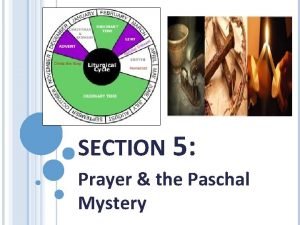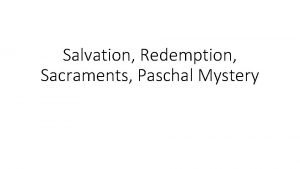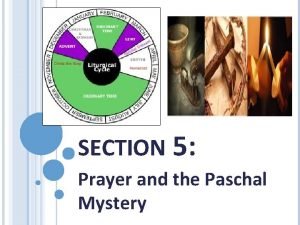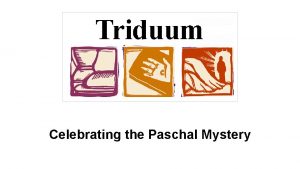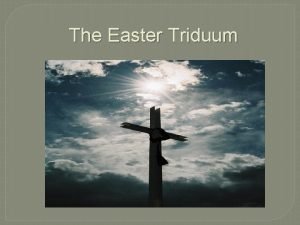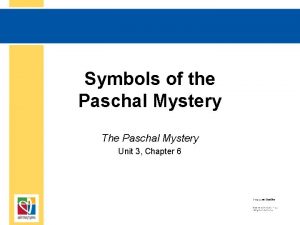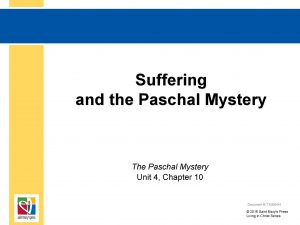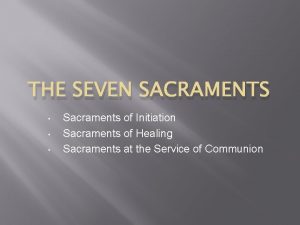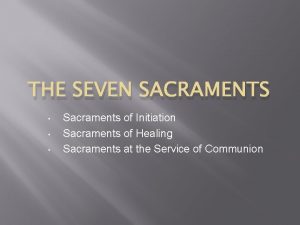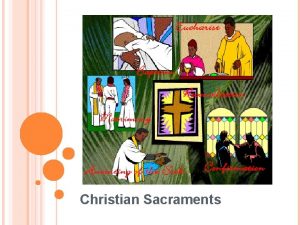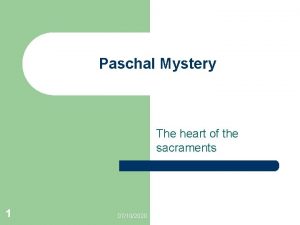Salvation Redemption Sacraments Paschal Mystery The meaning of












- Slides: 12

Salvation, Redemption, Sacraments, Paschal Mystery

The meaning of “Salvation” The woman in adultery was saved – how? • second chance at living life again • told to “sin no more” – re-focus on a better life • found herself in a relationship of friendship with Jesus • can hope for eternal life with him (if continues in this friendship). 1. Explain the meaning of “salvation”. *Should someone just desire salvation as eternal life in heaven? Changing for the better, is also growing closer to God. Growing closer to God, is also changing for the better.

The Last Supper (Thursday evening) Day 1: Good Friday Day 2: Holy Saturday The Triduum (the 3 days) The Paschal Mystery – the way Jesus accomplishes our salvation Then 40 days of feasting until • Describe the events of the Paschal mystery. (5 mks) • Explain the importance of the Paschal mystery for Christians (8 mks). Day 3: Easter Sunday (ends in evening) Day 40: Ascension Day 50: Pentecost

Christians worship Jesus as the one who saved them and made God’s grace possible for us Jesus’ death God’s love & mercy through the removing sin, Holy Spirit, helping us to act with restoring faith, hope and love, and avoid justice sin. Given through sacraments, prayer, repentance and good deeds. Jesus’ obedient death, accepted by God, restoring God’s friendship Christians live by trying to live in the freedom of God’s children – avoiding sin, and in accord with His grace Salvation – what does it mean? Reconciliation – how did Jesus do it? Grace – what is it and how is it received? Rescued from sin and death, to live in the freedom of God’s children Explain what salvation/ redemption means for Christians. (8 mks) Unique occasions of grace, given for a particular purpose/ vocation eg baptism, confirmation Sacraments: what What differences do they do? this makes:

Can Non-Christians be saved? Parable of sheep/ goats & Lazarus – good deeds/ faith in suffering can still bring people to heaven. St Cyprian C 3 rd: Extra Ecclesiam Nulla Salus (no salvation outside of the Church) Cyprian’s view was rejected as heresy – because Vatican II stated that God can also save people through whatever is good and true in other faiths and cultures. “Anonymous Christians” Only the Church possesses and guarantees the truth & grace that will save people, bringing them into the life of Jesus said “I have other sheep that are not of this fold, and these too I must lead, so that there will be one flock and one shepherd”. Jesus said: “I am the Way, the Truth and the Life. Noone can come to the Father except by Me. ” Jesus said: “he who believes in me and is baptized will be saved. He who does not, will be condemned”. Sort the arguments into two columns: what is your overall conclusion? **Why would a Catholic conclude that it is still better to be part of the Church?

A logical puzzle… • Either we are all saved, or we are all damned. • We are not all saved. • Therefore, we are all damned…

Explain the importance of the crucifixion to Christians. (8 mks)§ Explain the importance of the resurrection to Christians. (8 mks) Evaluate which is more important – the crucifixion or the resurrection? (15 mks)

Explain the importance of the crucifixion to Christians. (8 mks) Explain the importance of the resurrection to Christians. (8 mks) • Jesus was the perfect sacrifice restoring God’s friendship with the human race. Jesus really is the divine Son of God • Jesus paid the penalty for sin, so no sin can condemn us Sin and death really are forgiven • Jesus made grace possible – God’s help and mercy, given particularly through the sacraments of the Church • Christianity is a religion that is focused on having a relationship with God in Jesus – not laws. • Jesus’ sacrifice replaced less adequate worship - the animal sacrifices that kept on being offered in the Temple, but had no power to take sins away The life we receive in being joined to Jesus is an indestructible life Suffering and death do not need to be feared Evaluate which is more important – the crucifixion or the resurrection? (15 mks)

Sacraments • How many are there? • What does each one do? • How can they get grouped into 3 groups: • Initiation • Healing • Service

Sacraments A sacrament is “a visible sign of an invisible grace” • Why are visible signs needed? • What meanings do the signs used represent? Sacraments are established by God (Jesus) to be a unique meeting place with God, giving you grace (help of Holy Spirit) to fulfil a specific vocation. A sacrament effects a permanent and indelible change on a person’s spiritual character – their relation to God and to others is definitively transformed. Sacramental signs communicate the actual spiritual reality the sign stands for: cleansing, union, healing. How can they do this? • Because God became flesh in Jesus, it is appropriate to represent God in physical ways (= the incarnational view). • Since all nature is God’s creation, God’s grace can be mediated to us through it, in more or less perfect ways: the sacramental nature of reality. Sacraments are the most guaranteed, complete and purest channel for it. God became flesh (incarnation) Physical things can represent God Physical things can communicate God particularly if established by God in sacraments.

Explain the importance of the sacraments to Catholics. (8 mks) Include the following ideas: • Definition • Signs not only represent but communicate the spiritual reality • Guaranteed channels of God’s grace, meeting points with God • Sacrament types – of Initiation/ healing/ service • Grace for vocation/ service • Permanent, transforming change • sacramental nature of reality (from incarnational view)

Why are objects used in sacraments?
 Chapter 7 redemption through the paschal mystery
Chapter 7 redemption through the paschal mystery Paschal mystery prayer
Paschal mystery prayer Paschal mystery quotes
Paschal mystery quotes Your life in christ chapter 3 crossword answers
Your life in christ chapter 3 crossword answers Paschal mystery definition
Paschal mystery definition Paschal mystery prayer
Paschal mystery prayer Paschal meaning
Paschal meaning Triduum means
Triduum means Green symbolizes hope
Green symbolizes hope Universal salvation definition
Universal salvation definition Salvation belongs to our god meaning
Salvation belongs to our god meaning What is salvation
What is salvation What is the sacrament of vocation
What is the sacrament of vocation

